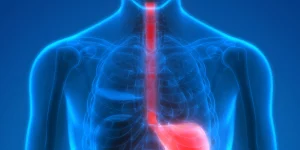Advanced Esophageal Cancer
 Patients with Stage 4 esophageal cancer have metastatic cancer that has spread to distant sites. Esophageal cancer mostly grows near where it started (in the chest and belly). As it progresses, it may grow into nearby organs like the liver and lungs. (It’s still called esophageal cancer, even though it’s moved somewhere else.)
Patients with Stage 4 esophageal cancer have metastatic cancer that has spread to distant sites. Esophageal cancer mostly grows near where it started (in the chest and belly). As it progresses, it may grow into nearby organs like the liver and lungs. (It’s still called esophageal cancer, even though it’s moved somewhere else.)
The following is an overview for the treatment of metastatic esophageal cancer. The information on this web-site is intended to help educate you about your treatment options and to create discussion to help in the decision-making process with your treatment team.
The predominant symptom of esophageal cancer is dysphagia, which simply means difficulty in swallowing food and liquids. There are specific treatments that can be administered that can result in short-term benefit and improvement in nutrition. Current treatment approaches are primarily directed at controlling the symptoms of cancer and prolonging survival. A number of treatment options are currently utilized alone or in combination to achieve optimal results.
Your cancer will ultimately influence the treatments that are right for your situation.
Treatment may also include surgery, radiation, targeted therapy, or a combination of these treatment techniques. Multidisciplinary treatment, which uses two or more treatment types, is important for every cancer patient and will help in creating a care plan and goals for improving a chance of cure or prolonging survival. In some cases, participation in a clinical trial may provide additional options.




